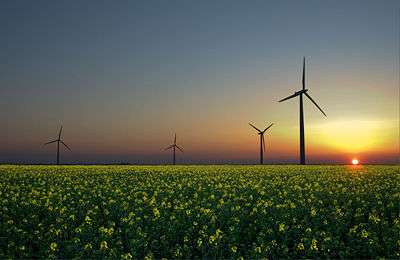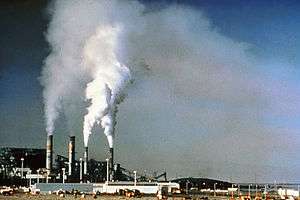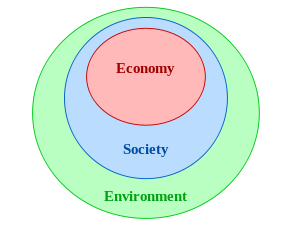Environmental Engineering and Renewable Energies



The Environmental Engineering and Renewable Energies[1] is the branch of engineering that operates in the areas of Environmental Engineering , Sanitary Engineering and Power Engineering.
The Environmental Engineering and Renewable Energies[2] studies the environmental problems in an integrated manner in its dimensions ecological , social , economic and technological , with a view to promoting sustainable development in addition to the problems concerning the energy. The Engineer Environmental and Renewable Energy should be able to recognize, interpret and diagnose negative and positive environmental impacts, assess the level of damage occurring in the environment and propose integrated solutions according to the right of the current environment.[3]
Objective Environmental Engineering course and Renewable Energy

- Offer conditions for the formation of an engineer with capacity and capability to research, develop and provide solutions that will lead to harmonization of the various human activities and the physical environment and its ecosystems;
- Offer content to provide clear understanding of the operating area of Environmental Engineering, which currently requires the integration of various fields of knowledge, with emphasis in the areas of environmental critical systems for evaluation and monitoring of impacts on the environment;
- To train professionals with capacity to plan, guide, oversee and coordinate projects involving multidisciplinary teams in relation to environmental problems;
- To train professionals capable of using current technology to solutions and predictions of environmental problems;
- Provide training in engineering, involving the fields of Physics, Computing and Mathematics, with proper support knowledge Ecology, Geosciences, Chemistry and Law.
Graduation time
- 10 semesters (5 years)
Institutions that offer the course [4]
- Federal Rural University of Amazonia - UFRA
- Federal University of Fronteira Sul - UFFS
- Faculdade Metropolitana de Manaus - FAMETRO
Practice Areas [5]
- The Bachelor of Science in Environmental Engineering and Renewable Energy formed can act as pollution control engineer in large projects such as hydroelectric plants, thermoelectric, basic industries (chemical and petrochemical, mining, steel and pulp and paper) and infrastructure (roads and railways). In the public sector, municipalities, environmental agencies and state companies that operate in the areas of water treatment and sewage, as well as conservation and restoration of degraded areas. In the private sector, the professional can work in the planning department, environmental management, consulting and audit.
Profile Egress
- The graduate of this course should be able to carry out research, to design, understand and develop new technologies for generation and processing of renewable energy. Should know and be able to assess the environmental impacts involved in energy issues, monitoring, control, and management and environmental quality. Must act in identifying problems and be able to point solutions to energy and environmental issues arising from production, generation and use of energy, meeting the demands of society. And it's a systemic training professional with an emphasis on environmental technologies, diagnostic tools, evaluation, environmental monitoring and modeling. This is all focused on sustainable economic development, whose goal is to see that the limits of use of natural resources are respected. Its main function is to preserve the quality of water, air and soil; Having the technology domain and methods of control and extraction in the mining and prepare environmental impact reports and plans for the sustainable use of natural resources and to develop strategies for mitigating actions. In addition to Deploy and run project evaluation and preparation of studies on the impact of human activities on the environment.
Prominent environmental engineers
See also
References
- ↑ "Curso de Engenharia Ambiental e Energias Renováveis". CREA-PA / Resolução nº 101, de 31 de maio de 2012. Retrieved 28 September 2016.
- ↑ "Aprova o Cadastramento do Curso de Engenharia Ambiental e Energias Renováveis" (PDF). CREA-PA. Retrieved 28 September 2016.
- ↑ "UFMG - Engenheiro Ambiental". Universidade Federal de Minas Gerais. Retrieved 28 September 2016.
- ↑ "Instituições de Educação Superior e Cursos Cadastrados". Instituições de Educação Superior e Cursos Cadastrados. Retrieved 28 September 2016.
- ↑ "Atribuições profissionais do Engenheiro Ambiental". CREA-SC. Retrieved 28 September 2016.
- Davis, M. L. and D. A. Cornwell, (2006) Introduction to environmental engineering (4th ed.) McGraw-Hill ISBN 978-0072424119
External links
| At Wikiversity, you can learn more and teach others about Environmental Engineering and Renewable Energies at the Department of Environmental Engineering and Renewable Energies |
- American Academy of Environmental Engineers and Scientists
- American Society of Agricultural and Biological Engineers
- American Society of Professional Wetland Engineers
- Association of Environmental Engineering and Science Professors
- Confederation of European Environmental Engineering Societies
- European Federation of Association of Environmental Professionals
- Environmental Engineering Portal
- Institute of Environmental Management and Assessment
- Environmental Ethics
